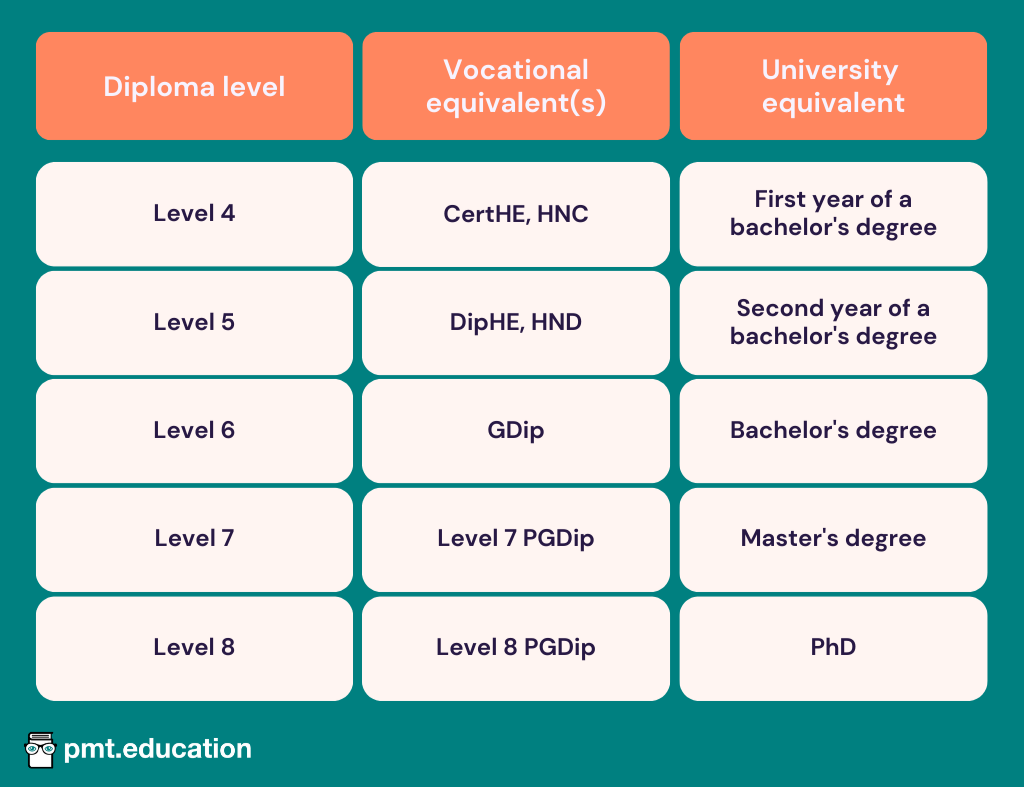Contents:
If you’re considering a qualification that offers focused, practical knowledge in a specific field, diplomas might be the right path for you. Understanding the variety of diploma qualifications, such as the Diploma of Higher Education, Higher National Diploma, Graduate Diploma, and Postgraduate Diploma, can be challenging. With so many terms and levels, it’s easy to feel confused about what each one represents.
This guide will eliminate the confusion surrounding diplomas by breaking down the distinctions between each type. It will also showcase potential alternatives, providing clear explanations to help you navigate your education and career options effectively.
What is a diploma?
A diploma is a career-specific qualification designed to equip students with the knowledge and skills needed for a particular industry. These courses are often shorter in duration compared to traditional university degrees, making them an attractive option for aspiring professionals who want to enter the workforce quickly and gain high-level skills in a specific field.
Diplomas can be vocational, academic or a mixture of both depending on the focus of the course. They serve as an alternative to university education, allowing students to start at Level 4 (equivalent to the first year of a bachelor’s degree) and progress towards qualifications that are equivalent to a degree. For those already holding a degree, diploma courses can be a valuable way to convert to a new discipline or gain specialised expertise.
Diploma courses typically require less time and financial commitment than full degree programmes, with most courses offering full-time or part-time study options. This allows students to tailor their education to their career goals and personal circumstances.
Having a clear career path is essential when choosing diploma courses, as they are designed to guide you toward a specific profession rather than an academic field.

What are the different types of diploma courses?
Post-school diploma options range from Level 4 (equivalent to the first year of a bachelor’s degree) to Level 7+ (postgraduate level).
Level 4 Diploma
A Level 4 Diploma is equivalent to the first year of a bachelor’s degree and is typically taken after completing A Levels or other Level 3 courses.
Level 4 Diplomas generally consist of 120 credits and can be completed in about a year. Covering a wide range of subjects, including STEM, each programme is unique. They are an excellent choice for those looking to enhance their CV for career progression, or continue their education to Level 5 courses.
While all Level 4 Diplomas offer valuable qualifications, the Certificate of Higher Education (CertHE) and the Higher National Certificate (HNC) are two particularly well-recognised options. These qualifications not only make you eligible for student finance, but also tend to be more highly regarded by employers.
What is a Certificate of Higher Education (CertHE)?
A Certificate of Higher Education (CertHE) is a specific type of Level 4 qualification that is widely recognised and tends to be more academic than practical. Unlike some vocational diplomas, a CertHE is typically assessed through written work, essays, and assignments, making it a good fit for those who prefer academic study. It is awarded by various bodies, including many UK universities.
The CertHE can be an excellent option for individuals who want to experience university education but didn’t achieve the necessary grades for a full degree course or aren’t ready to commit to a three or four-year programme. It can be pursued as a standalone qualification or as a stepping stone towards a bachelor’s degree, often through a Diploma of Higher Education (DipHE).

What is a Higher National Certificate (HNC)?
A Higher National Certificate (HNC) is a type of Level 4 qualification that focuses on practical, hands-on learning and is awarded by Edexcel (or the SQA in Scotland). It is typically assessed through practical tasks and projects, though some academic written work may be included. With lower entry requirements than a full degree, an HNC is ideal for those looking to enter a specific industry quickly and gain employment.
The HNC is particularly suited for individuals who prefer learning through practical experience and are eager to develop industry-specific skills. It can also serve as a pathway to further study, such as progressing to a Higher National Diploma (HND).
Level 5 Diploma
A Level 5 Diploma is equivalent to the second year of an undergraduate degree and is typically designed to build on the foundational knowledge gained at Level 4. They can vary in length and credit value, but they are often completed in about one year and worth 120 credits.
These programmes are ideal for those seeking to enhance their career prospects, increase their earning potential, or continue their education. With some Level 5 Diplomas, students can progress to a top-up degree and enter the final year of a bachelor’s programme, provided they have evidence of 120 credits at Levels 4 and 5.
Two widely recognised options at this level are the Diploma of Higher Education (DipHE) and the Higher National Diploma (HND), both of which offer the advantage of being eligible for student finance and providing a solid foundation for further academic or professional development.
What is a Diploma of Higher Education (DipHE)?
A Diploma of Higher Education (DipHE) is a Level 5 qualification that builds on the knowledge gained from a Certificate of Higher Education (CertHE). The first year of a DipHE is equivalent to a CertHE, and students have the option to exit after the first year with a CertHE if they choose not to continue. Likewise, those with a CertHE can progress directly into the final year of a DipHE.
The DipHE is a recognised academic qualification, assessed through essays, coursework, and exams. Typically completed in two years, it is worth 240 credits. Offered by various institutions, including universities, the DipHE is a popular route for those aiming to progress to a top-up degree, allowing them to enter the final year of a bachelor’s programme. It also enhances career prospects and professional development opportunities.

What is a Higher National Diploma (HND)?
A Higher National Diploma (HND) is a Level 5 qualification that expands upon the knowledge gained from a Higher National Certificate (HNC), and is equivalent to the first year of the HND. Often, there is flexibility between these courses. Students with an HNC can advance directly to the final year of an HND, and those in an HND programme can exit after the first year and receive an HNC.
Typically equivalent to the first two years of a bachelor’s degree, the HND is worth 240 credits. It emphasises hands-on learning and practical assessments, and is awarded by Edexcel in England, Wales and Northern Ireland or the Scottish Qualifications Authority (SQA) in Scotland. The HND is a popular choice for those aiming to enter the workforce directly, but it can also provide a pathway to further education, allowing students to progress into the second or third year of a vocational bachelor’s degree programme.
Level 6 Diploma
A Level 6 Diploma demonstrates a high level of knowledge and skills in a particular area of study, equivalent to completing a bachelor’s degree. It is designed for students who have already completed a Level 5 qualification or as a conversion course for those who wish to change specialisms after their undergraduate degree.
Earning a Level 6 Diploma can open up significant career progression opportunities and serves as a strong foundation for further education, including postgraduate-level courses. Note that you usually cannot get student loans for these courses.
A widely recognised example of this qualification is the Graduate Diploma (GradDip). It is typically worth 120 credits, equating to one year of full-time study, and is offered by universities. The Graduate Certificate (GradCert) is a shorter, highly specialised course that usually takes 150 hours to complete (15 credits).
Level 7 Diploma
A Level 7 Diploma is an advanced qualification that is equivalent in level to a master’s degree, though there are some key differences. Designed for advanced specialisms or as a conversion course for those looking to shift their focus after previous studies, a Level 7 Diploma is typically worth 120 credits and usually takes about one year to complete. In contrast, a full master’s degree is worth 180 credits and usually takes 18 months to two years.
Unlike a master’s degree, a Level 7 Diploma does not include a dissertation. However, after completing the diploma, you can opt to complete a dissertation to upgrade to a full master’s degree. This makes the Level 7 Diploma a shorter and often more cost-effective option for those seeking advanced qualifications without the commitment of a full master’s programme.
This qualification often marks the end of formal education, leading directly to advanced career opportunities. While Level 8 Diplomas exist, they are usually pursued by professionals in strategic and management roles rather than specific STEM fields.
A common well-respected example of a Level 7 Diploma is the Postgraduate Diploma (PgDip), which typically takes about one year to complete and is worth 120 credits. A shorter alternative is the Postgraduate Certificate (PgCert), which is worth 60 credits and can be completed in about six months.
Professional registration
Some diploma qualifications, such as HNCs and HNDs, can contribute to achieving certain professional titles, such as Registered Scientist (RSci) or Engineering Technician (EngTech).
Professional registration is a formal recognition of your expertise and commitment to your career, often awarded by professional bodies within your industry. These bodies, which can range from broad organisations like the Institute of Physics to niche groups like the Institution of Railway Signal Engineers, set industry standards and offer different levels of membership based on your qualifications and experience.
Diploma levels: Summary
There’s a lot to take in, so to help simplify things, here’s a summary of the types and levels of post-school diploma courses available.

What diploma courses are available in STEM?
The table below highlights some popular STEM diploma course titles across the various types and levels discussed above.
How to find diploma courses
Finding diploma courses can be straightforward if you know where to look. Here are some effective ways to find the right course:
- Government websites: Websites like the National Careers Service for England offer databases of available courses, allowing you to filter by course type, learning method, and level.
- Online course portals: Platforms such as UCAS (covering all levels), FindAMasters (for postgraduate qualifications), and Academic Courses (offering a variety of courses worldwide) are excellent tools for searching for diploma courses.
- University and college websites: Many universities and colleges provide a range of diploma courses with detailed information on entry requirements, course content, duration, and application procedures. The Open University, known for its distance learning and flexible study options, is a popular choice for these programmes.
- Open days and career fairs: Attending university open days, college fairs, or career fairs allows you to speak directly with course providers, gather information, and explore various diploma options in person.
- Networking and recommendations: Sometimes the best courses are found through word-of-mouth. Speaking with industry professionals, career advisors, or alumni can provide valuable insights.
It is often beneficial to pursue a diploma programme after gaining employment, as your employer may recommend specific courses. They may even sponsor you by covering some, or all, of the course fees.
Level 4+ NVQs: A similar alternative
NVQs (National Vocational Qualifications) are a practical, vocational alternative to diplomas, offering a flexible route for career development. Covering a wide range of subjects, including STEM, NVQs place a strong emphasis on developing career-related skills that align with industry needs.
NVQs are typically more hands-on compared to diplomas, focusing on practical experience rather than academic study. They often have no entry requirements, although higher-level courses may require some prior industry knowledge or experience. Completing an NVQ leads to a recognised certification, demonstrating that you have met national standards for your chosen field.
If you’re looking for a career-focused qualification with a flexible learning path, NVQs could be the right fit.

Diploma courses vs university degrees: Is one better?
When deciding between diploma courses and university degrees, it’s important to consider the pros and cons of each route. Both options offer unique advantages tailored to different career goals and personal circumstances.
Remember, you don’t always need to choose between a degree and a diploma course. Many graduates pursue diplomas as conversion courses or to enhance their skills.
This table compares diploma courses and university degrees across various categories.
Whether diploma courses or university degrees are more suitable depends on your career goals, financial situation, and personal preferences. Diplomas offer practical, career-specific training with flexibility and lower costs, while degrees provide a more comprehensive and academically rigorous education with potentially greater long-term benefits.
So, are diploma courses worth it? Let us know in the comments!

Comments